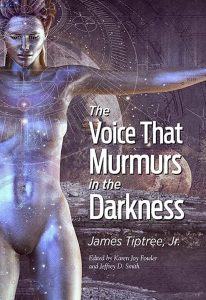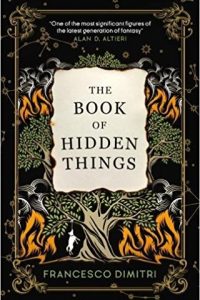Gary K. Wolfe Reviews The Voice That Murmurs in the Darkness by James Tiptree, Jr.
 The Voice That Murmurs in the Darkness, James Tiptree, Jr. (Subterranean 978-1-64524-107-2, $45.00, 376pp, hc) May 2023.
The Voice That Murmurs in the Darkness, James Tiptree, Jr. (Subterranean 978-1-64524-107-2, $45.00, 376pp, hc) May 2023.
The last line in James Tiptree, Jr.’s last story is “He headed down the highway, to encounter the existential Unknown.” The story, “In Midst of Life”, is haunting for a number of reasons, not least of which is its description of the surprisingly gentle afterlife of a man who has just committed suicide – as Alice Sheldon herself would do only months later. The story is also the final selection in The Voice That Murmurs in the Darkness, a collection of thirteen stories and one essay compiled by Karen Joy Fowler and Jeffrey D. Smith, intended to highlight Tiptree’s lesser-known work and largely drawn from Alice Sheldon’s own “cream of Tiptree” list of favorite stories. The title is also Sheldon’s; it’s supposedly her own description of Tiptree. These stories are anything but murmurs, though, and a few of them are downright screams. The book is a terrific way to re-introduce yourself to Tiptree, or to recapture some of the excitement that readers and fellow writers felt a half-century ago. It’s also a timely reminder that Tiptree, who has deservedly become a staple in SF classes with stories like “The Women Men Don’t See”, “Houston, Houston, Do You Read”, and “The Screwfly Solution” (and yes, I realize that last one was technically a Raccoona Sheldon story), also worked on a much more eclectic SF canvas.
At the same time, it’s almost impossible to read these stories now without the temptation to probe them for autobiographical hints and psychological clues, and I confess I found myself turning back to Julie Phillips’s brilliant biography James Tiptree, Jr.: The Double Life of Alice B. Sheldon for context. I don’t know if that was a good idea or not. Certainly, it’s fascinating to learn that a lab rat in “The Psychologist Who Wouldn’t Do Awful Things to Rats” has the same odd name – Snedecor – that Sheldon gave to one of her own lab rats in the early 1960s, but even without that personal connection, the story offers one of the most harrowing descriptions I’ve ever read of animal cruelty in the name of science. Is there a degree of personal irony in “Excursion Fare”, which describes a couple lost at sea when their balloon crashes, only to be rescued as the last minute by a ship which turns out to be a floating hospice – but which also carries a much larger and darker secret? (Rescues in Tiptree’s fiction don’t often turn out well.)
One idea which recurs in two stories published 13 years apart seems to suggest a darkening shift in attitude. “All the Kinds of Yes” (1972) is a cheerfully comic tale, almost reminiscent of Douglas Adams, of an alien who arrives in Washington, assumes human form, and is taken in by a group of collegiate slackers, only to reveal that it’s pregnant and that its thousands of voracious offspring will destroy everything on the planet. Fortunately, the alien manages to find another planet and whisks off just in time. Similarly, an alien taken aboard the private spaceship of the privileged 15-year-old girl Coati in “The Only Neat Thing to Do” (1985) – the most important story in the collection – turns out to be a brain parasite, living amicably in Coati’s brain until its reproductive urge kicks in, which will release thousands of spores that threaten to consume not only Coati’s brain but that of everyone she comes in contact with. Here there is no last-minute reprieve, however, and Coati’s solution – the only neat thing to do – gives us a phrase that now inevitably seems to resonate, almost tragically, with what we know of Alice Sheldon. (It also might serve as an acerbic rebuke to Tom Godwin’s “The Cold Equations”, which Sheldon had earlier parodied.)
Other stories also serve as reminders of Tiptree’s connections to SF traditions. “Beam Us Home”, as its title suggests, alludes to Star Trek in describing a young fan of the series who yearns for its optimism after seeing the brutality of an actual war in Venezuela. Like Lucius Shepherd and a number of other SF writers in the 1980s, Tiptree speculated that America’s next Vietnam-style military involvement would be in Latin America, and her war against the “Guévaristas” shows up again in “Yanqui Doodle”, a bleak horror story about the harrowing rehabilitation process for soldiers who had been supplied with performance-enhancing addictive drugs to make them essentially into berserkers in battle. Tiptree also seemed to share a common assumption from that period that catastrophic futures were likely to be either the result of nuclear war or of overpopulation, as an alien explains in “Excursion Fare”. “Time-Sharing Angel”, the most direct treatment of overpopulation and environment, begins with a powerful image of giant earthmovers and chainsaws destroying entire swaths of forest to make room for thousands of new houses. “Ecology”, thinks the 19-year-old protagonist, “wasn’t something distant, somewhere else with strip mines. It was the awful devastation of her lovely valley”. Other stories include “The Man Doors Said Hello To”, an odd fantasy featuring a man who keeps minuscule women in his pockets, and “What Comes Ashore at Lirios”, the only example of Tiptree’s Quintana Roo tales, which features an androgynous ghostly figure who challenges the protagonist’s notions of gender. The one essay, a mordantly witty description of Sheldon’s own heart attack, serves to remind us that Tiptree’s decidedly sharp and unsentimental voice didn’t spare Alice Sheldon herself. The Voice That Murmurs in the Darkness isn’t really a “best of” collection – that’s probably still 1990’s Her Smoke Rose Up Forever – or a comprehensive career overview, but is rather a well-curated selection of stories that hold up remarkably well, and that remind us what all that excitement way back in the 1980s was really about.
[Edited to change pub date from April to May. 5/18/23]
Gary K. Wolfe is Emeritus Professor of Humanities at Roosevelt University and a reviewer for Locus magazine since 1991. His reviews have been collected in Soundings (BSFA Award 2006; Hugo nominee), Bearings (Hugo nominee 2011), and Sightings (2011), and his Evaporating Genres: Essays on Fantastic Literature (Wesleyan) received the Locus Award in 2012. Earlier books include The Known and the Unknown: The Iconography of Science Fiction (Eaton Award, 1981), Harlan Ellison: The Edge of Forever (with Ellen Weil, 2002), and David Lindsay (1982). For the Library of America, he edited American Science Fiction: Nine Classic Novels of the 1950s in 2012, with a similar set for the 1960s forthcoming. He has received the Pilgrim Award from the Science Fiction Research Association, the Distinguished Scholarship Award from the International Association for the Fantastic in the Arts, and a Special World Fantasy Award for criticism. His 24-lecture series How Great Science Fiction Works appeared from The Great Courses in 2016. He has received six Hugo nominations, two for his reviews collections and four for The Coode Street Podcast, which he has co-hosted with Jonathan Strahan for more than 300 episodes. He lives in Chicago.
This review and more like it in the April 2023 issue of Locus.
 While you are here, please take a moment to support Locus with a one-time or recurring donation. We rely on reader donations to keep the magazine and site going, and would like to keep the site paywall free, but WE NEED YOUR FINANCIAL SUPPORT to continue quality coverage of the science fiction and fantasy field.
While you are here, please take a moment to support Locus with a one-time or recurring donation. We rely on reader donations to keep the magazine and site going, and would like to keep the site paywall free, but WE NEED YOUR FINANCIAL SUPPORT to continue quality coverage of the science fiction and fantasy field.
©Locus Magazine. Copyrighted material may not be republished without permission of LSFF.








This title is dated April 2023, but Subterranean Press still had it as a pre-order when I read this review & went to the website to order it on 05-17-23. I did order it, & appreciate the review. The two most influential short story writers on my own work are R. A. Lafferty & James Tiptree, Jr.
Thanks for the note! It’s pretty common for the pub dates to shift at the last minute. I’ll correct in the post.
Hard to believe there’s no “Collected Stories,” yet, for Tiptree/Sheldon.